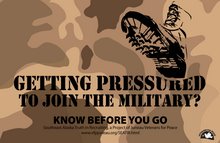This
editorial appeared in the Juneau Empire today
Web posted October 28, 2007
A decision as consequential as joining the military should be made carefully with a sober understanding of what serving our country entails.
That is why the Juneau Empire believes that when military recruiters visit Juneau-Douglas High School, members of Southeast Alaska Truth in Recruiting should be allowed in as well, to represent another point of view.
Recently, National Guard recruiter Sgt. Seth Beebe asked the Juneau School Board to restrict the anti-recruiting group's access to students. He pointed to a brochure distributed by the group that states: "The atmosphere in the military encourages rape, murder and other kinds of violence against civilian women."
Beebe said such brochures make for an uncomfortable atmosphere for recruiters, and this may be arguably true. But to deny access to the anti-recruiting group would be a disservice to the students.
Southeast Alaska Truth in Recruiting, a project of the Juneau chapter of Veterans for Peace, is staffed by veterans - or family members of veterans - who can share with students their own experiences of military life. The group can give students another perspective before making the life-changing decision to join the armed services.
What the anti-recruiters do is set up a table in the school's commons every time a recruiter visits, which is three times a year as allowed by the Juneau School Distinct. Members hand out literature and talk to the occasional student who stops by the table. The group isn't aggressively vying for the attention of the students or actively protesting the recruiters' presence on campus.
But some of the literature the group passes out is questionable, and actually serves to hurt the group's credibility.
The brochure Beebe singled out was addressed to young women and is full of inflammatory statements and strained logic. In one section, the flier implies that the U.S. military uses rape as a weapon, then cites United Nations figures on rape in the Congo.
Amy Paige, who heads Southeast Alaska Truth in Recruiting, acknowledges that the brochure was a misstep. The group receives its materials from outside organizations, such as the American Friends Service Committee, the Central Committee for Conscientious Objectors and the War Resisters League. Paige said perhaps the controversial flier wasn't as fully vetted by her committee as it should have been.
The group has since pulled the flier. Paige said she'd like her group to address women's issues in a future pamphlet that's not perceived as a direct attack on the military. She pointed out that her group is made up of veterans or family members of veterans who "are not ready to smear the whole military."
Some in Paige's group believe recruiters shouldn't be in the schools at all. Nevertheless, the military offers future educational opportunities in the form of scholarships and vocational training. Students have every right to this information.
We support allowing recruiters on campus, but there needs to be a check against unscrupulous recruitment. Undoubtedly, our local recruiters are upfront with students about the pros and cons of military service. Nevertheless, our military is stretched thin - fighting wars in Iraq and Afghanistan - and the pressure on recruiters to keep the ranks full is undeniable.
Both sides need to be presented to students, but Southeast Alaska Truth in Recruiting needs to realize incendiary smears against the military hurt the group's credibility when it claims to "offer balanced information." The group needs to stick to sharing its veterans' military experiences with students and providing information on actual scholarship rates and terms of enlistment.
It's clear both sides don't want the other talking to students, but ultimately the students need to make a choice on whether to serve or not. As long as there's a fair debate, we trust the students will make the right personal decision.




![[Recruit]](http://s.wsj.net/public/resources/images/MK-AN015_RECRUI_20071128175302.jpg)






